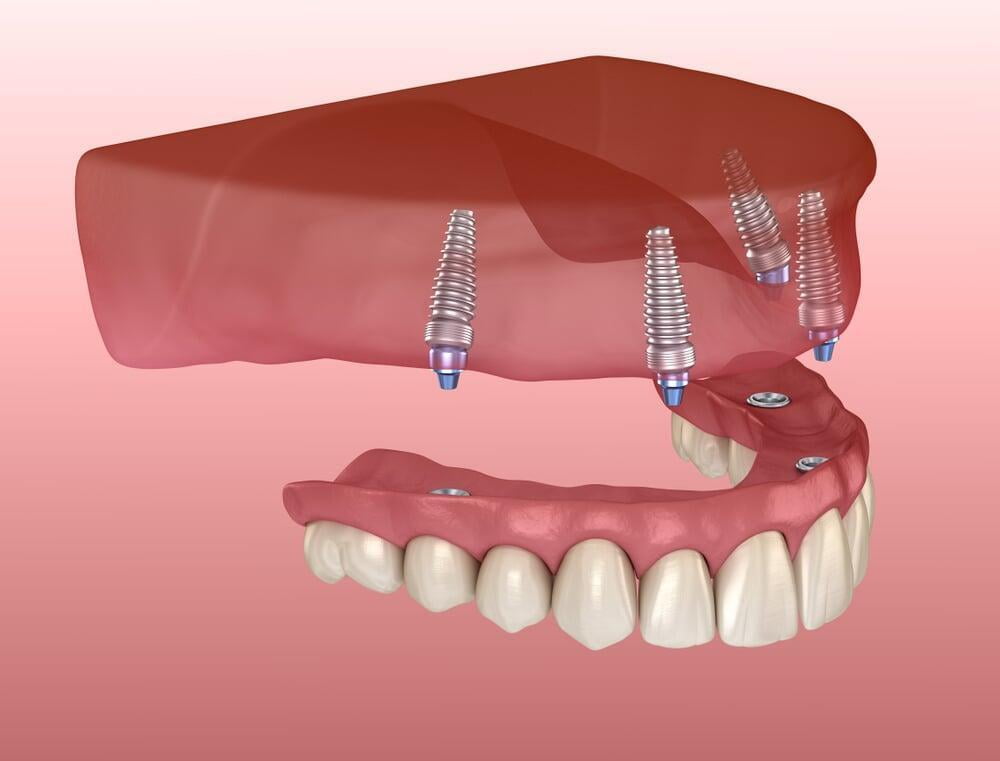WHAT ARE DENTURES?
A denture is a removable replacement for missing teeth and surrounding tissues. Two types of dentures are available, complete and partial dentures. Complete dentures are used when all the teeth are missing, while partial dentures are used when some natural teeth remain.
Complete Dentures fit over the upper teeth and roof and on the lower teeth placed like a horseshoe. They are conventional dentures and are removed during the night for cleaning.
Partial Dentures consists of replaced missing teeth attached to artificial gum connected by a metal framework which helps to hold the denture in place.


TYPE OF DENTURES-
- Traditional Dentures: Traditional dentures are dentures held in the mouth by nothing other than passive retention. This means that impressions are taken of the mouth (without teeth) and dentures are fabricated precisely to the underlying gum. People who have this type of denture have to rely on adhesives or pastes to keep the denture in place throughout the day.
- Implant Dentures: This type of denture technically isn’t a denture at all, it’s more like a fixed bridge. Typically 4 or 6 dental implants are placed on the upper and lower arch. The denture hybrid (implant denture) is actually fixed to the implants in the mouth. This is the most stable option and does not need to be removed each night. Some other names for this type of denture are “All on 4″ or “Teeth in an Hour.” The advantage to implant supported dentures is that they are the most stable and aesthetic option; they are the best!
- Overdenture: This is a denture that is essentially attached to either two dental implants or two mini-implants. You can see how this option helps to stabilize and retain the denture in the mouth. The denture will actually “click” into the two positions. Old dentures (or your existing denture) can usually be retro-fit to accommodate this new denture. This is the second best denture option for long term use.
Ho do I care for my NEW TEETH?
- To clean your dentures, you should use a toothbrush specially designed for dentures and a denture cleanse. Regular toothpaste should not be used because it may be too abrasive for dentures. After removing and cleaning the prosthesis, rinse it and submerge it in a denture-cleaning solution.
- If you were a partial denture, make certain when you floss and brush your natural teeth that you take special care to clean the area around the clasps, as trapped food particles, combined with salivary acids and bacteria, may cause these abutment teeth to be more susceptible to decay.
- A well – fitted appliance will adhere to the oral tissues with the natural aid of saliva. Using a denture adhesive may make the fit worse! Check with us before routinely using any denture adhesive material.
Will I experience changes in the way I SPEAK or CHEW
- You may find that you occasionally bite your tongue or cheek until you get used to having these spaces filled. Initially, you may want to choose a soft or liquid diet, making sure to avoid sticky or hard foods, Cutting food into smaller bites can be helpful. With full dentures you may also find it helpful to chew off bits of food from the side, rather than directly from the front.
- You may notice some salivary an taste changes associated with your replacement teeth. These are to be expected when a new prosthesis is introduces. With time, you will adjust to these changes and will feel a high degree of confidence and comfort when speaking and chewing
MYTHS ABOUT DENTURES
- It’s difficult to eat with Dentures on – There are no restrictions on what kind of food to eat. Initially, you might be advised to intake certain kind of diet but with time you will be able to eat whatever you wish but precautions are necessary.
- Lifetime Solution – If not taken proper care, the dentures may not last for long. Also, over a period they may start to wear down, loosen their natural appearance and chewing ability
- Do not require proper care – Though artificial, dentures work exactly like your real teeth, therefore, it is extremely important to take care of dentures the way you take care of your teeth.
- No further visits to the Dentist – Your oral health does not include only your teeth but also gums, tongue, and tissues. Regular visits to the dentist will ensure everything is being taken care of.
